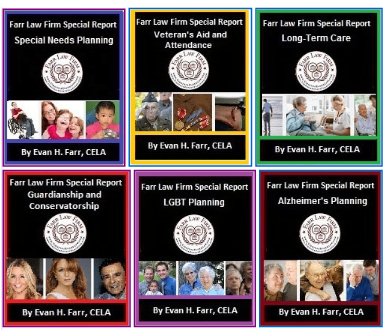Don't Attempt this on Your Own
If you cannot view the image below, please read the article on our blog.

Image from Scientific American
Q. My Aunt Linda is very stubborn. She has been divorced twice, has three kids, two step-children, and a grandchild on the way. She did her estate planning documents when she was married to her first husband, and insists on making updates to them with a red pen. I told her that her handwritten updates might not hold up in court, and she may end up leaving everything to her first husband and his son, who she isn't even
related to and doesn’t get along with. She refuses to believe me. She is a do-it-yourselfer (DIYer) in every other way (she even remodeled her own kitchen!), and wants to continue in her DIY ways with her estate planning documents. Are the handwritten updates she made to her Will enough to ensure that her wishes will be met?
A. Please let your Aunt Linda know that while it's commendable that she's a DIYer, estate planning documents are not something you should do (or make updates to) yourself. This is because, when people try to prepare or alter their own legal documents, there is a great likelihood of making serious legal mistakes or oversights, and they’ll never know because these errors won’t become apparent until they die. And, in these
situations, the people left to deal with the mistakes and oversights are the ones they're probably trying to protect.
Take for example, Esther Sullivan, who validly executed a Will on January 19, 2006. Her Will provided that 50% of her property would pass to a former employee named Tara Jean Johnson, with the other 50% to Esther’s grandson, Joseph VanHale. In 2008, when Ms. Sullivan changed her mind, and she made a photocopy of the 2006 Will and went to work trying to change the terms herself. The main change was to remove Ms. Johnson from the distributions
and provide that all of her property would pass to her grandson.
She added her initials next to each change, included her signature and date at the bottom of each page, and prefaced it all at the top of the first page with an explicit statement declaring that her 2006 Will was void, and should be replaced with her new 2008 version. In 2010, in fear that her 2008 efforts would not be valid, she downloaded a Will template of some sort where she filled in by hand all of the pertinent provisions of her 2008 Will.
After Ms. Sullivan died in 2013, the inevitable dispute ensued in probate court between Mr. VanHale, who would receive all of the decedent’s assets if either the 2010 Will or the 2008 Will governed, and Ms. Johnson, who would receive half of the assets if the 2006 Will was valid. The probate court ruled that the 2008 photocopy and the 2010 downloaded document were invalid because they did not comply with the state’s requirements for a valid Will, which include
that the Will must be signed by at least two witnesses. The court also held that although Ms. Sullivan probably intended to revoke the 2006 Will, she did not do so successfully. The Court was forced to disregard Ms. Sullivan’s handwritten statement indicating that she wanted to revoke the 2006 Will.
In August 2015, Mr. VanHale appealed, arguing that Ms. Sullivan clearly intended to revoke the 2006 Will and that the 2010 document was valid. The Court of Appeals of Minnesota agreed with the lower court that only the original 2006 Will was properly executed and was never properly revoked. Therefore, the 2006 Will was admitted and its terms governed the settlement of Ms. Sullivan’s estate.
To read the court’s decision in the case, In re the Estate of Sullivan (Minn. Ct. App., No. A14– 2112, Aug. 17, 2015), click here.
How Can You/Your Aunt Avoid A Fate Similar to Esther Sullivan?
Updating Your Estate Plan
The only way to ensure that your estate plan truly reflects who you are, what you care about, and what your wishes are is to have your documents reviewed and updated as needed. And as you can see from our example, it is essential to involve an experienced estate planning attorney when making any changes. So, when are updates needed? The list below pinpoints certain examples of events that could have a significant impact on your estate.
• You get married or divorced
• Your spouse dies or becomes incapacitated
• You become ill or disabled
• You have a new child
• Your child marries or divorces
• Your child becomes ill or disabled
• You have a new grandchild
• One of your beneficiaries shows signs of being financially irresponsible
• One of your beneficiaries develops a drug or alcohol problem
• The value of your assets has significantly increased or decreased
• You retire or change employment
• You acquire property in a different state
• You move to a different state
• There have been changes in the law that may affect the language of your documents.
Even if no changes are necessary, most people should annually sign updated Powers of Attorney because some financial institutions won’t accept a Power of Attorney more than a year old. Similarly, the older an Advance Medical Directive is, the less likely it is that it will be honored by a doctor or hospital.
Avoiding Probate
When many first consider Estate Planning, they immediately think of preparing a Last Will and Testament. While having a Will is slightly better than dying without a Will (i.e., dying intestate), Wills also have some major drawbacks – the biggest drawback being that a Will forces your estate to go through probate. The probate process is lengthy, expensive, and public. Read this article for more details on the nightmare of probate and how to avoid it.
Don’t Let Too Much Time Pass Between Reviews of Your Plan.
The cost of a review is minimal; but the cost to your family if you neglect your plan could be disastrous. If you haven’t updated your estate plan in the last few years, or done your own estate planning, the time is now. Be sure to ask about The Farr Law Firm’s Lifetime Protection Program, which ensures that your documents are properly reviewed and updated
annually, so that they Will always reflect your current wishes and be up to date with the ever-changing laws. Call us to make an appointment for a no-cost consultation:
Fairfax Estate Planning Attorney: 703-691-1888
Fredericksburg Estate Planning Attorney: 540-479-1435
Rockville Estate Planning Attorney: 301-519-8041
DC Estate Planning Attorney: 202-587-2797
-----
Critter Corner: Is Estate Planning Needed for Cohabitating Couples?

Dear Commander Bun Bun,
I live with my boyfriend, Rich, in a house we own together. For a number of reasons, we have decided not to get married, but will continue to cohabitate for the foreseeable future. Why would people in our situation need to do estate planning?
Thanks!
Liv Togeth-Herr
---
Dear Liv,
Even though cohabitation may be legal, unmarried cohabitants face unique estate planning challenges regarding incapacity, inheritance, and estate taxation. Therefore, estate planning is especially important for people in your situation. Below are some of the challenges cohabitating couples face without proper estate planning and incapacity planning in place:
• Unlike their married counterparts, unmarried cohabitants will not be able to make fundamental health and financial decisions for one another in the event of incapacity.
• Absent proper legal planning, state laws that determine the distribution of assets of a person who dies without an estate plan will leave nothing to the surviving cohabitant.
• The unlimited marital deduction is an unlimited deduction for estate (and gift) tax purposes, but only for transfers between spouses.
• It is vital that couples who elect to cohabitate obtain expert legal counsel to minimize or eliminate these adverse results.
Without proper estate and incapacity planning – and depending on how assets are titled – an unmarried partner could receive nothing and even potentially be forced out of the home the couple may have shared for years. This can be a very unpleasant surprise for people who have planned their life together, but chose not to get married.
It is highly recommended that couples in your situation meet with a Certified Elder Law Attorney, such as Evan H. Farr, to explore their estate planning options to avoid unwanted consequences when one partner passes away. It’s crucial that people don’t assume that their partner will be “taken care of” by other family members or heirs.
Hop this is helpful,
Commander Bun Bun
--------
Sign up for our FREE Special Reports and get the answers to your burning questions! Just click on a cover below!

|
| Special Offer |
|
We’re Giving Away My Best-Selling Books – Click Here to Find out Why and to Get Your Free Copies
|
| |
| Find Us |
|
|
| Upcoming Events |
|
Our upcoming Living Trust Plus: How to Protect Your Assets from the Expenses of Probate and Long Term Care seminar is on October 10, November 21, or December 12 in Fairfax.
----------
|
Article Reprint Authorization
|
We invite you to reprint our articles to bring helpful content to your readers, with the following guidelines:
-The article is to be printed in its entirety;
-Additions, deletions, or changes in the text, title or illustrations may not be made;
-Credit is given to The Law Firm of Evan H. Farr, P.C., as the original source.
Example:
Source: Reprinted from The Law Firm of Evan H. Farr, P.C. Newsletter (www.FarrLawFirm.com).
|
|
Mailing Address
|
Fairfax:
10640 Main Street
Suite 200
Fairfax, VA 22030
703-691-1888
Fredericksburg:
511 Westwood Office Park
Fredericksburg, VA 22401
540-479-1435
Rockville, MD:
1 Research Court
Suite 450
Rockville MD 20850
301-519-8041
Washington, DC:
1425 K Street, NW
Suite 350
Washington, DC 20005
202-587-2797
|
|

